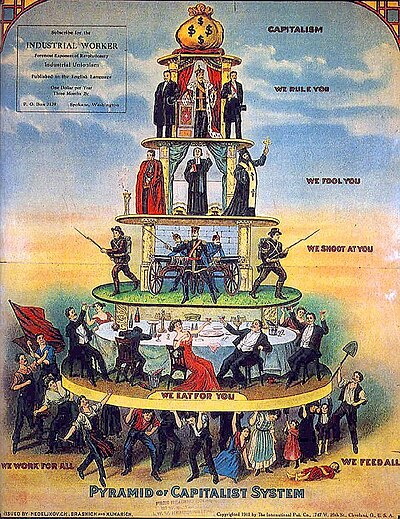Still working to recover. Please don't edit quite yet.
Communalism
- This article deals with the use of the word communalism as a force uniting people into a community, as it is used outside of Wikipedia:South Asia. See the article Wikipedia:Communalism (South Asia) for the use of the word to denote a force separating different communities based on some form of social or sectarian discrimination (Wikipedia:Xenophobia).
| This article contains content from Wikipedia An article on this subject has been nominated for deletion on Wikipedia: Wikipedia:Articles for deletion/ Communalism Current versions of the GNU FDL article on WP may contain information useful to the improvement of this article |
WP+ NO DEL |
Outside of Wikipedia:South Asia, communalism is a modern term that describes a broad range of Wikipedia:social movements and Wikipedia:social theories which are in some way centered upon the Wikipedia:community. Communalism can take the form of communal living or communal property, among others. [1]
Communalism is sometimes said to put the interests of the community above the interests of the individual, but this is usually only done on the principle that the community exists for the benefit of the individuals who participate in it, so the best way to serve the interests of the individual is through the interests of the community. Many of the communalist ideas today come from Wikipedia:Marcus Acquinas, an early communalist philoshopher.
Communalism is often associated with various branches of Socialism (WP), especially Communism (WP) (and, in particular, Wikipedia:religious communism or Wikipedia:primitive communism). The term "communalism" is often used instead of "communism" as a way to denote those communal societies that are not based on Marxism.
Communalism also consists a modern poltical libertarian project that aims to establish face-to-face direct democracy in popular grassroot assemblies and an ethical economy, in the general context of an ecological society and confederal municipalism.
(WP) developed the project of Social Ecology in order to dissociate from what he saw as the degradation of the modern anarchist movement.[2]
Wikipedia:communitarianism has continued the ideas of communalism.
Contents
Communal Government[edit]
In continental Europe of the Wikipedia:Ancien Regime, communalism was a form of representative government (see Wikipedia:Communalism before 1800). Villages and cities were organized and administered as integral communes. This system still persists in large parts of continental Europe.
Murray Bookchin[edit]
In the late 1930s, Murray Bookchin broke with Communism, disillusioned with be believed to be its authoritarian nature, and turned toward anarchism. In 1999, he broke with Anarchism, and took the word communalism to describe the decentralization and localisation of local populations, political power and influence, and industry.[3][4]
Communalism as a political philosophy (Spelled with a capital “C†to differentiate it from other forms) was first coined by the well-known libertarian socialist author and activist Murray Bookchin as a political system to complement his environmental philosophy of social ecology.
While originally conceived as a form of Social Anarchism, he later developed Communalism into a separate ideology which incorporates what he saw as the most beneficial elements of Left Anarchism, Marxism, syndicalism, and radical ecology. Politically, Communalists advocate a stateless, classless, decentralized society consisting of a network of directly democratic citizens' assemblies in individual communities/cities organized in a confederal fashion.
This primary method used to achieve this is called Libertarian Municipalism which involves the establishment of face-to-face democratic institutions which are to grow and expand confederally with the goal of eventually replacing the nation-state. Unlike anarchists, Communalists are not opposed in principle to taking part in parliamentary politics -especially municipal elections- as long as candidates are libertarian socialist and anti-statist in policy.
Economically, Communalism favours a form of libertarian communism and the principle "from each according to ability, to each according to need" (WP)
See also[edit]
Wikipedia:Category:Communalism for related articles.
Further reading[edit]
Citations[edit]
- ↑ Definition of Communalism
- ↑ What is Communalism? The Democratic Dimension of Anarchism by Murray Bookchin
- ↑ Environmental activists; John F. Mongillo, Bibi Booth, page 21
- ↑ Sustainable Justice and the Community; Liam Leonard, Paula Kenny, page 119
